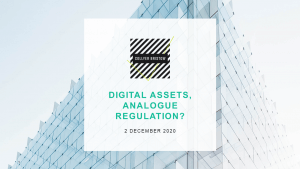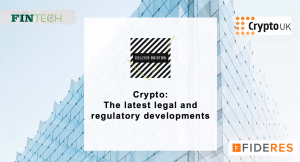- FinTech

Shorter Reads
It’s Blockchain your Honour
1 minute read
Published 23 October 2018
Key information
- Services
- FinTech
In September 2018, China’s Supreme Court ruled blockchain records as admissible legal evidence. The Internet Courts in China can now use blockchain records to settle internet-related legal disputes.
If the relevant parties collect and store their data via blockchain, with digital signatures, reliable time stamps and hash value verification or via a digital deposition platform and can prove the authenticity of their technology, it will be recognised, the Supreme People’s Court statement said.
This may not be a surprise to some, as four months ago, China’s first Internet court in Hangzhou, ruled that evidence which has been authenticated using blockchain technology is legally binding.
(Block)Chain Reaction?
The application and admissibility of blockchain in the Court room has yet to be widely seen.
Though blockchain records have been declared admissible as evidence by the US state of Vermont, and China’s latest ruling shows an appetite for the Courts accepting the new technology.
In Vermont, the state signed a bill into law which allowed a ‘digital record electronically registered in a blockchain’ to be ‘self-authenticating’ ‘if it is accompanied by a written declaration of a qualified person, made under oath’. The Court is still requiring human verification of the system, and does not yet irrefutably trust the technology, but it is certainly a step in the right direction.
Quick off the starting Block
Courts will have to get familiar with blockchain following its rapid development and uptake. No doubt Smart Contracts will bring with them the same disputes as other contractual agreements, and when these come to fruition, new technology will be at the heart of any case.
The adoption of blockchain based technology to store corporate records, such as stock ledgers, books of accounts and minutes (as has been done by Delaware’s General Corporate Law in the US) could lead to a wide variety of cases involving issues of business ownership and shareholder disputes requiring blockchain evidence to be admitted.
In the UK, the Land Registry’s steps towards a register based on blockchain (most recently seen in their appointment of software company Methods in their project Digital Street) may reduce some disputes, as they progress towards complete and accurate records, but will also lead to cases where title records stored on a blockchain need to be admitted as evidence.
The UK Government has also disclosed plans to conduct a pilot project for storing digital evidence on a blockchain, which was revealed in an announcement by Balaji Anbil, Head of Digital Architecture and Cyber Security at Her Majesty’s Courts and Tribunals Service (HMCTS). The system intends to create a digital evidence audit to preserve the digital chain and provide a “chronological record of system activities which capture how digital evidence has been created/accessed/modified by which entity, from what location, in such a way to enable the reconstruction and examination of the sequence of events, and actions leading to the current state of the digital evidence.”
This move is encouraging in terms of the UK Court’s potential to accept blockchain evidence, which would be rendered necessary if such a system was adopted.
Whilst the UK Court seems keen to embrace technology from an administrative point of view, it will be interesting to see how the Court reacts to the evidential questions the new technology will bring and the implications of architectural decisions in the technology, such as open or closed networks, access to keys and tokens.
Associated sectors / services
In September 2018, China’s Supreme Court ruled blockchain records as admissible legal evidence. The Internet Courts in China can now use blockchain records to settle internet-related legal disputes.
If the relevant parties collect and store their data via blockchain, with digital signatures, reliable time stamps and hash value verification or via a digital deposition platform and can prove the authenticity of their technology, it will be recognised, the Supreme People’s Court statement said.
This may not be a surprise to some, as four months ago, China’s first Internet court in Hangzhou, ruled that evidence which has been authenticated using blockchain technology is legally binding.
(Block)Chain Reaction?
The application and admissibility of blockchain in the Court room has yet to be widely seen.
Though blockchain records have been declared admissible as evidence by the US state of Vermont, and China’s latest ruling shows an appetite for the Courts accepting the new technology.
In Vermont, the state signed a bill into law which allowed a ‘digital record electronically registered in a blockchain’ to be ‘self-authenticating’ ‘if it is accompanied by a written declaration of a qualified person, made under oath’. The Court is still requiring human verification of the system, and does not yet irrefutably trust the technology, but it is certainly a step in the right direction.
Quick off the starting Block
Courts will have to get familiar with blockchain following its rapid development and uptake. No doubt Smart Contracts will bring with them the same disputes as other contractual agreements, and when these come to fruition, new technology will be at the heart of any case.
The adoption of blockchain based technology to store corporate records, such as stock ledgers, books of accounts and minutes (as has been done by Delaware’s General Corporate Law in the US) could lead to a wide variety of cases involving issues of business ownership and shareholder disputes requiring blockchain evidence to be admitted.
In the UK, the Land Registry’s steps towards a register based on blockchain (most recently seen in their appointment of software company Methods in their project Digital Street) may reduce some disputes, as they progress towards complete and accurate records, but will also lead to cases where title records stored on a blockchain need to be admitted as evidence.
The UK Government has also disclosed plans to conduct a pilot project for storing digital evidence on a blockchain, which was revealed in an announcement by Balaji Anbil, Head of Digital Architecture and Cyber Security at Her Majesty’s Courts and Tribunals Service (HMCTS). The system intends to create a digital evidence audit to preserve the digital chain and provide a “chronological record of system activities which capture how digital evidence has been created/accessed/modified by which entity, from what location, in such a way to enable the reconstruction and examination of the sequence of events, and actions leading to the current state of the digital evidence.”
This move is encouraging in terms of the UK Court’s potential to accept blockchain evidence, which would be rendered necessary if such a system was adopted.
Whilst the UK Court seems keen to embrace technology from an administrative point of view, it will be interesting to see how the Court reacts to the evidential questions the new technology will bring and the implications of architectural decisions in the technology, such as open or closed networks, access to keys and tokens.
Associated sectors / services
- FinTech
Need some more information? Make an enquiry below.
Enjoy reading our articles? why not subscribe to notifications so you’ll never miss one?
Subscribe to our articlesMessage us on WhatsApp (calling not available)
Please note that Collyer Bristow provides this service during office hours for general information and enquiries only and that no legal or other professional advice will be provided over the WhatsApp platform. Please also note that if you choose to use this platform your personal data is likely to be processed outside the UK and EEA, including in the US. Appropriate legal or other professional opinion should be taken before taking or omitting to take any action in respect of any specific problem. Collyer Bristow LLP accepts no liability for any loss or damage which may arise from reliance on information provided. All information will be deleted immediately upon completion of a conversation.
Close








































